(完整版)人教版八年级英语上册书上听力材料(共13页)
- 格式:docx
- 大小:21.29 KB
- 文档页数:14
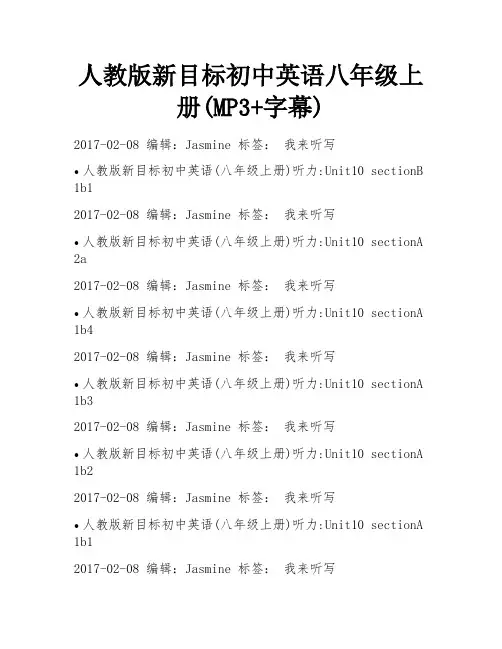
人教版新目标初中英语八年级上册(MP3+字幕)2017-02-08 编辑:Jasmine 标签:我来听写•人教版新目标初中英语(八年级上册)听力:Unit10 sectionB 1b12017-02-08 编辑:Jasmine 标签:我来听写•人教版新目标初中英语(八年级上册)听力:Unit10 sectionA 2a2017-02-08 编辑:Jasmine 标签:我来听写•人教版新目标初中英语(八年级上册)听力:Unit10 sectionA 1b42017-02-08 编辑:Jasmine 标签:我来听写•人教版新目标初中英语(八年级上册)听力:Unit10 sectionA 1b32017-02-08 编辑:Jasmine 标签:我来听写•人教版新目标初中英语(八年级上册)听力:Unit10 sectionA 1b22017-02-08 编辑:Jasmine 标签:我来听写•人教版新目标初中英语(八年级上册)听力:Unit10 sectionA 1b12017-02-08 编辑:Jasmine 标签:我来听写•人教版新目标初中英语(八年级上册)听力:Unit9 sectionB 1d2017-02-08 编辑:Jasmine 标签:我来听写•人教版新目标初中英语(八年级上册)听力:Unit9 sectionA 2a52017-02-08 编辑:Jasmine 标签:我来听写•人教版新目标初中英语(八年级上册)听力:Unit9 sectionA 2a42017-02-08 编辑:Jasmine 标签:我来听写•人教版新目标初中英语(八年级上册)听力:Unit9 sectionA 2a32017-02-08 编辑:Jasmine 标签:我来听写•人教版新目标初中英语(八年级上册)听力:Unit9 sectionA 2a22017-02-08 编辑:Jasmine 标签:我来听写•人教版新目标初中英语(八年级上册)听力:Unit4 sectionB 1c2016-12-31 编辑:Jasmine 标签:我来听写•人教版新目标初中英语(八年级上册)听力:Unit7 sectionB 1c32016-12-31 编辑:Jasmine 标签:我来听写•人教版新目标初中英语(八年级上册)听力:Unit8 sectionB 1c2016-12-16 编辑:Jasmine 标签:我来听写。
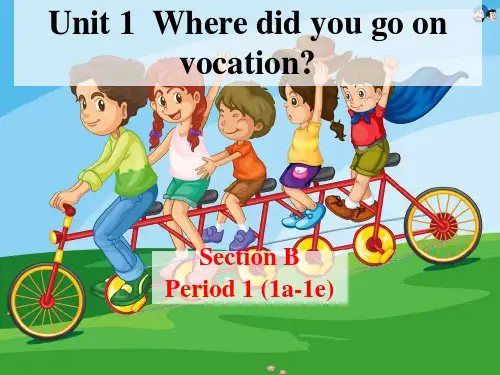
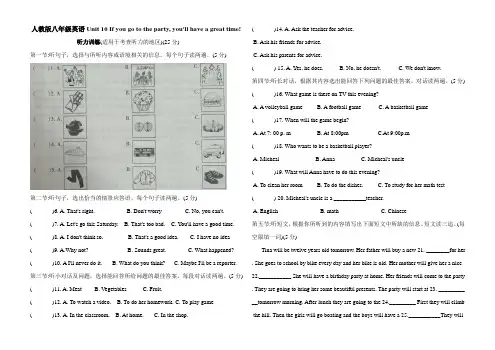
人教版八年级英语Unit 10 If you go to the party, you'll have a great time!听力训练(适用于考查听力的地区)(25分)第一节:听句子,选择与所听内容或语境相关的信息。
每个句子读两遍。
(5分)第二节:听句子,选出恰当的情景应答语。
每个句子读两遍。
(5分)( )6. A. That's right. B. Don't worry C. No, you can't. ( )7. A. Let's go this Saturday. B. That's too bad. C. You'll have a good time. ( )8. A. I don't think so. B. That's a good idea. C. I have no idea ( )9. A.Why not? B. Sounds great. C. What happened? ( )10. A I'll never do it. B. What do you think? C. Maybe I'll be a reporter. 第三节:听小对话及问题,选择能回答所给问题的最佳答案。
每段对话读两遍。
(5分) ( )11. A. Meat B. Vegetables C. Fruit.( )12. A. To watch a video. B. To do her homework. C. To play game( )13. A. In the classroom. B. At home. C. In the shop. ( )14. A. Ask the teacher for advice.B. Ask his friends for advice.C. Ask his parents for advice.( ) 15. A. Yes, he does. B. No, he doesn't. C. We don't know.第四节:听长对话,根据其内容选出能回答下列问题的最佳答案。
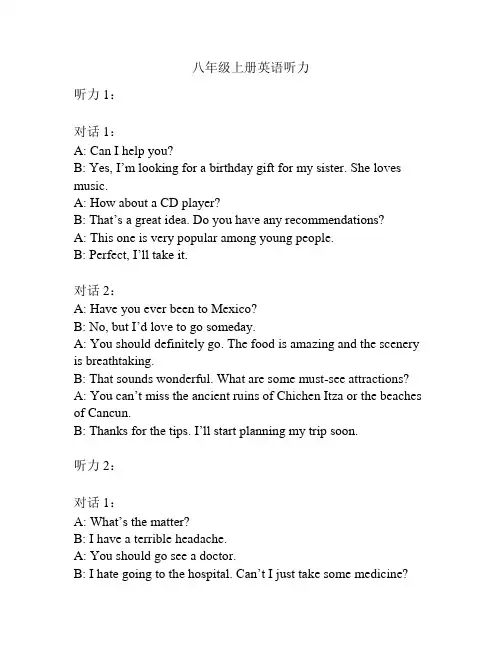
八年级上册英语听力听力1:对话1:A: Can I help you?B: Yes, I’m looking for a birthday gift for my sister. She loves music.A: How about a CD player?B: That’s a great idea. Do you have any recommendations?A: This one is very popular among young people.B: Perfect, I’ll take it.对话2:A: Have you ever been to Mexico?B: No, but I’d love to go someday.A: You should definitely go. The food is amazing and the scenery is breathtaking.B: That sounds wonderful. What are some must-see attractions? A: You can’t miss the an cient ruins of Chichen Itza or the beaches of Cancun.B: Thanks for the tips. I’ll start planning my trip soon.听力2:对话1:A: What’s the matter?B: I have a terrible headache.A: You should go see a doctor.B: I hate going to the hospital. Can’t I just ta ke some medicine?A: You can, but it’s best to get a professional opinion.B: I guess you’re right. I’ll make an appointment.对话2:A: How was your trip to New York?B: It was great. I saw all the famous sights and tried lots of new foods.A: That sounds fun. Did you go to any museums?B: Yes, I went to the Metropolitan Museum of Art. It was amazing. A: I’ve always wanted to go there. What was your favorite exhibit? B: The Egyptian artifacts were really fascinating. You should definitely check it out when you get the chance.听力3:对话1:A: I’m so nervous about my math test tomorrow.B: You’ve been studying hard, right? You’ll do fine.A: I hope so. I’ve been having trouble with fractions.B: Maybe you should try watching some online tutorials or getting a tutor.A: That’s a good idea. Thanks for the advice.对话2:A: How was your weekend?B: It was great. I went to a concert on Saturday and hung out with friends on Sunday.A: Who did you see in concert?B: I saw Taylor Swift. She was amazing.A: I love her music. Did she perform any of her new songs?B: Yes, she did. They were really catchy. I can’t stop singing them.听力4:对话1:A: Can I borrow your calculator for a minute?B: Sure, here you go. What do you need it for?A: I need to calculate the area of this rectangle for my math homework.B: I think you just multiply the length by the width, right?A: That’s right. Thanks for the help.对话2:A: What’s your favorite sport?B: I love playing basketball. It’s so much fun.A: Do you watch professional basketball games too?B: Yes, I’m a big fan of the NBA. I like watching LeBron James play.A: He’s one of the best players in the league. Do you have a favorite team?B: Yes, I root for the Golden State Warriors. They’re really exciting to watch.听力5:对话1:A: Can you believe the school year is almost over?B: It went by so quickly. What are your plans for the summer? A: I’m going to a summer camp for two weeks and then I’ll be traveling with my family.B: That sounds like fun. Where are you going?A: We’re going to Europe. We’re visiting Italy, France, and Spain. B: Wow, that’s amazing. Take lots of pictures and tell me all about it when you get back.对话2:A: I can’t find my cell phone anywhere.B: Have you checked your pockets?A: Yes, and my bag too. I think I left it at the library.B: You should go back and see if it’s still there.A: I will, but I have to finish this assignment first. I’ll go after class. B: Good luck finding it.。
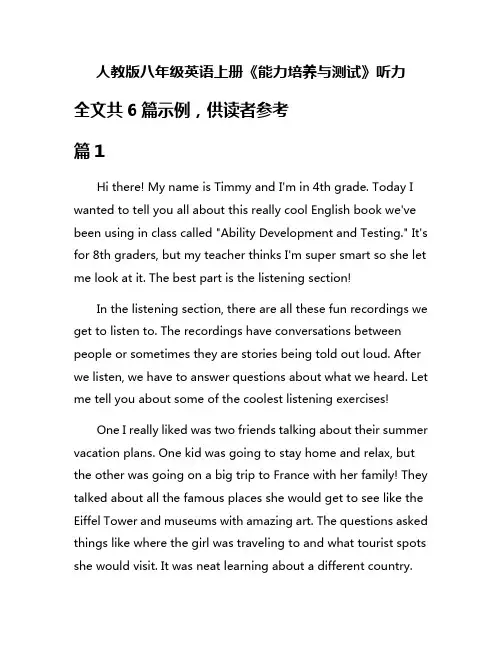
人教版八年级英语上册《能力培养与测试》听力全文共6篇示例,供读者参考篇1Hi there! My name is Timmy and I'm in 4th grade. Today I wanted to tell you all about this really cool English book we've been using in class called "Ability Development and Testing." It's for 8th graders, but my teacher thinks I'm super smart so she let me look at it. The best part is the listening section!In the listening section, there are all these fun recordings we get to listen to. The recordings have conversations between people or sometimes they are stories being told out loud. After we listen, we have to answer questions about what we heard. Let me tell you about some of the coolest listening exercises!One I really liked was two friends talking about their summer vacation plans. One kid was going to stay home and relax, but the other was going on a big trip to France with her family! They talked about all the famous places she would get to see like the Eiffel Tower and museums with amazing art. The questions asked things like where the girl was traveling to and what tourist spots she would visit. It was neat learning about a different country.Another listening was about a brother and sister arguing over who got to pick the family's movie night film that week. The sister wanted to watch a comedy but the brother wanted an action movie. Their mom had to step in and say they had to take turns each week. The argument reminded me of how my little brother and I are always fighting over the TV remote! The questions asked you to summarize what the argument was about and how their mom solved it. Even though I don't have a sister, I could totally relate!But my absolute favorite listening was a super spooky ghost story! It was about a haunted house in the woods that kids dared each other to go inside on Halloween night. The story described the creepy sounds and sights like doors creaking open by themselves and ghostly blue lights down the hall. I loved all the scary details! The questions asked you to describe the setting and identify specific spooky events that happened. I got a few wrong because I thought the ghost story was so fun and exciting that I missed some of the pequeños detalles.In class, we have to take turns reading the questions out loud and saying our answers. At first I was shy, but now I love getting volunteered so I can show off how well I understood the listening. Though sometimes the questions are tricky and askabout minor details I missed, I'm getting better each time at focusing and concentrating.Overall, the listening sections are my favorite part of "Ability Development and Testing." The recordings are always really engaging stories or convos that make you want to pay attention. And the questions check your comprehension in a fun way, without it feeling like a boring test. I may only be in 4th grade, but I'm totally rocking the 8th grade listening exercises! Who run the world? KIDS!篇2Hi everyone! My name is Emily and I'm a 5th grader at Redwood Elementary School. Today I want to tell you all about the listening part of the 8th grade English textbook we use. It's called "Developing and Testing Abilities" and boy, does it really make you work on your listening skills!The first unit is all about asking for and giving directions. There are these conversations between people asking how to get to different places around town. The speakers use phrases like "Could you tell me how to get to..." or "Take the second left after..." It's kind of tricky because they talk pretty fast and you really have to pay attention to every word. Sometimes they eventhrow in extra details that aren't important for the directions. I got mixed up a few times at first!After listening to the conversations, there are multiple choice questions testing if you understood the directions correctly. You have to pick things like which building they were trying to find, or the order of the turns to take. My teacher says this helps prepare us for really listening carefully to all the details when someone is explaining something. She's right, it's not easy!The next unit is about describing personalities. There are lots of different speakers talking about their friends, family members, teachers, etc. They use personality adjectives like "outgoing," "shy," "patient," and "studious." The trick is trying to match up who they're describing with the personality traits. Some of the people they mention have really similar personalities, so you have to distinguish the subtle differences.For the questions, you might have to check off which words describe a certain person. Or they'll ask you to identify who is being described by a particular set of traits. It's gotten me really thinking about how I perceive and describe the personalities of people in my life. I've started writing down notes about my friends to practice for this unit. Does that make me a weirdo? I hope not!Unit 3 is my favorite - it's all about holidays and traditions around the world. You get to learn about cool festivities like Diwali, Brazilian Carnival, and Chinese New Year. The speakers discuss the different customs, foods, activities, and cultural meanings behind each celebration. There are recordings of people preparing for holidays, talking about memorable experiences, or explaining the history behind certain traditions.The questions ask you to identify things like dates, locations, symbolic meanings, special foods, and other key details about the holidays. I love learning about the fascinating traditions practice篇3Hi there! My name is Emma, and I'm an 8th grader at Oakwood Middle School. Today, I want to share my thoughts on the "Ability Development and Testing" unit we're currently studying in our English class. I know, it might sound like a boring topic, but trust me, it's way more interesting than you think!One of the things I've learned in this unit is that developing our abilities is super important. It's not just about getting good grades or being the best at everything. It's about discovering ourstrengths, working on our weaknesses, and becomingwell-rounded individuals. After all, we're not robots program篇4My Journey with English Ability TestsHi there! I'm a little 8th grader, and I want to share my experiences with the English ability tests we've been taking this year. It's been quite a ride, let me tell you!When I first heard about these tests, I was a bit nervous, to be honest. English has always been a bit of a challenge for me, with all those weird rules and pronunciations. But my teacher, Mrs. Smith, assured us that these tests were designed to help us improve our skills and track our progress. She said they'd cover listening, speaking, reading, and writing – the whole shebang!The first test was on listening comprehension. We had to put on our headphones and listen to various dialogues and passages, then answer questions about what we heard. I found it pretty tough at first, especially when they spoke really fast or used words I didn't know. But after a few practice tests, I started getting the hang of it. I learned to focus and catch the key details, even if I didn't understand everything.Next up was the speaking test. This one made me super nervous! We had to record ourselves answering questions and describing pictures. I practiced like crazy, trying to sound natural and not too robotic. On test day, I stumbled over a few words, but overall, I think I did okay. Mrs. Smith said my pronunciation was improving, which made me feel proud.Then came the reading comprehension test. This one was a bit easier for me since I'm a bookworm at heart. We had to read passages and answer questions about the main ideas, details, and vocabulary. The key was to read carefully and not get distracted by the harder words or sentences.Finally, we had the writing test. This was my biggest challenge, to be honest. I've never been a strong writer, and putting my thoughts into coherent English sentences was tough. But Mrs. Smith had taught us some great strategies, like brainstorming ideas, making an outline, and checking our work for errors. I tried my best, and while my essay wasn't perfect, I felt like I had shown improvement.Throughout this whole process, Mrs. Smith was so supportive and encouraging. She reminded us that these tests weren't just about getting a grade, but about learning where our strengths and weaknesses were so we could keep improving. Shealso taught us some great test-taking strategies, like managing our time, staying calm, and double-checking our answers.I have to admit, these ability tests were no walk in the park. They challenged me in ways I hadn't expected, and there were definitely moments when I wanted to give up. But in the end, I'm really glad I stuck with it. Not only did I learn a lot about my English skills, but I also learned valuable lessons about perseverance, hard work, and believing in myself.Now, as I look ahead to the next set of tests, I feel much more confident and prepared. I know there will be new challenges and struggles篇5Certainly! Here's a 1000-word article written from a primary school student's perspective, discussing the 'Ability Development and Testing' listening section in the English textbook for Grade 8, published by the People's Education Press:Hi there, my name is Lucy, and I'm a primary school student. Today, I want to talk to you about the 'Ability Development and Testing' listening section in our English textbook for Grade 8. As a young learner, this part of the book is both exciting and challenging for me.First of all, let me tell you how cool it is to have listening exercises in our English book! It's like we're not just reading and writing, but we're also practicing our listening skills, which is super important for learning a language. The listening tasks are like little adventures where we get to hear different people speaking English, and it's our job to understand what they're saying.Now, I know what you're thinking – listening can be really hard, especially when the speakers are using words or expressions that we're not familiar with. But that's the fun part! The listening exercises in our book gradually become more difficult, so we can challenge ourselves and improve our skills step by step.One of the things I love about the listening section is the variety of topics and situations it covers. Sometimes we listen to conversations between friends talking about their plans for the weekend, and other times we hear interviews with people from different countries or cultures. It's like we're getting a glimpse into the lives of English speakers from all over the world!Another cool thing about the listening section is that it often includes little language tips or cultural notes to help us understand the context better. For example, if the speakers use aslang expression or refer to a specific tradition, there's usually an explanation in the footnotes or the teacher's guide. It's like having a little language buddy guiding us through the listening experience!Now, I know what you're thinking – "But Lucy, what if I get stuck or don't understand something?" Well, that's totally normal! Even the best language learners have moments where they feel a bit lost. That's why our teacher always encourages us to ask questions, rewind the audio if needed, or even listen to it multiple times. The goal is not to get everything perfect on the first try, but to keep practicing and improving gradually.And you know what the best part is? The listening exercises in our book aren't just for testing our abilities – they're also designed to help us develop those abilities. By exposing us to different accents, speaking styles, and contexts, we're training our ears and our brains to become better listeners in English.So, even though the 'Ability Development and Testing' listening section can be challenging at times, it's also a lot of fun and super helpful for our English learning journey. Who knows, maybe one day we'll be able to understand English speakers from all over the world without even thinking about it!Well, that's all I have to say about the listening section for now. I hope you found my little story interesting and maybe even a bit inspiring. Remember, learning a language is all about practice, patience, and having fun along the way. So, keep listening, keep trying, and most importantly, keep enjoying the adventure!篇6Title: My Journey with English Ability TestsHi there! My name is Emily, and I'm an 8th-grader at Sunshine Middle School. Today, I want to share my experience with the "Ability Development and Testing" section in our English textbook. It's a journey filled with challenges, surprises, and a whole lot of fun!When I first opened the textbook, I was a bit nervous. The word "testing" always made me feel like I was about to face some scary monsters. But as I started reading, I realized that these tests were not here to scare me; they were like friendly guides, helping me explore the wonderful world of English.The first test was all about listening. I had to put on my headphones and listen carefully to different conversations and stories. At first, I found it a bit tricky to catch all the words, butmy teacher gave us some fantastic tips. She taught us to focus on the key words and the overall context, instead of trying to understand every single word. It was like learning a secret code to unlock the meaning!Next up were the reading tests. I love reading stories, so this part was really exciting for me. The texts were interesting and fun, with characters I could relate to. Sometimes, there were tricky words or phrases that I didn't understand, but my teacher encouraged us to use context clues and our critical thinking skills to figure them out. It was like being a detective, searching for hidden clues in the text.Writing was another adventure we embarked on. I'll be honest; I used to find writing a bit boring and tedious. But the writing tasks in our textbook were so creative and engaging! We had to write stories, descriptions, and even scripts for short plays. My favorite was when we had to write a letter to a fictional character, giving them advice on a problem they were facing. It was like becoming a wise, old mentor for a day!But the part I enjoyed the most was the speaking tests. I love talking and expressing myself, so these tasks were right up my alley. We had to have conversations with our classmates, give presentations, and even do some roleplay. It was like being anactor on stage, except without the fancy costumes and bright lights.Looking back, I realize that these "Ability Development and Testing" sections were not just about evaluating our English skills; they were about learning, growing, and having fun along the way. Each test was like a new adventure, filled with surprises and challenges that helped us become better communicators and thinkers.Now, as I prepare for the next chapter in my English learning journey, I feel confident and excited. The tests have shown me that I have the tools and abilities to tackle any language challenge that comes my way. It's like I've been given a magical sword and shield to slay the dragons of language barriers!So, if you're ever feeling nervous or unsure about ability tests, just remember: they're not monsters to be feared; they're friendly guides, ready to take you on an exciting adventure. Embrace the challenge, have fun, and let the journey begin!。
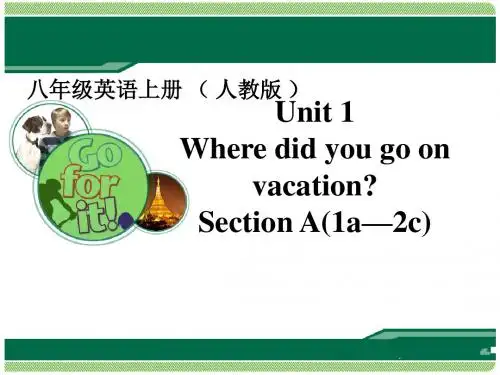
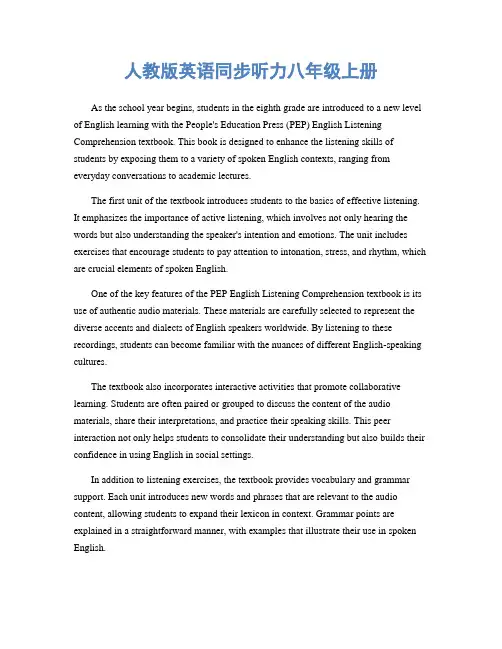
人教版英语同步听力八年级上册As the school year begins, students in the eighth grade are introduced to a new level of English learning with the People's Education Press (PEP) English Listening Comprehension textbook. This book is designed to enhance the listening skills of students by exposing them to a variety of spoken English contexts, ranging from everyday conversations to academic lectures.The first unit of the textbook introduces students to the basics of effective listening. It emphasizes the importance of active listening, which involves not only hearing the words but also understanding the speaker's intention and emotions. The unit includes exercises that encourage students to pay attention to intonation, stress, and rhythm, which are crucial elements of spoken English.One of the key features of the PEP English Listening Comprehension textbook is its use of authentic audio materials. These materials are carefully selected to represent the diverse accents and dialects of English speakers worldwide. By listening to these recordings, students can become familiar with the nuances of different English-speaking cultures.The textbook also incorporates interactive activities that promote collaborative learning. Students are often paired or grouped to discuss the content of the audio materials, share their interpretations, and practice their speaking skills. This peer interaction not only helps students to consolidate their understanding but also builds their confidence in using English in social settings.In addition to listening exercises, the textbook provides vocabulary and grammar support. Each unit introduces new words and phrases that are relevant to the audio content, allowing students to expand their lexicon in context. Grammar points are explained in a straightforward manner, with examples that illustrate their use in spoken English.The PEP English Listening Comprehension textbook is not just about passive absorption of information; it encourages active engagement with the language. Students are prompted to reflect on their listening experiences, identify areas for improvement, and set personal goals for their language development.As the semester progresses, the listening tasks become more challenging, pushing students to refine their skills. They encounter a variety of listening situations, such as understanding the main ideas in a news report, following instructions in a how-to guide, or identifying opinions in a debate. These tasks simulate real-life scenarios where effective listening is essential.The ultimate goal of the PEP English Listening Comprehension textbook is to equip students with the listening proficiency needed for academic success and beyond. By the end of the course, students should be able to comprehend spoken English with ease, engage in conversations with confidence, and appreciate the richness of the English language.In conclusion, the PEP English Listening Comprehension textbook for eighth-grade students is a comprehensive resource that fosters the development of listening skills. Through its engaging content, interactive approach, and focus on real-world application, it prepares students for the diverse communicative challenges they will encounter in their academic and personal lives. The textbook stands as a testament to the importance of listening in language acquisition and the joy that comes with understanding and connecting with others through spoken words.。
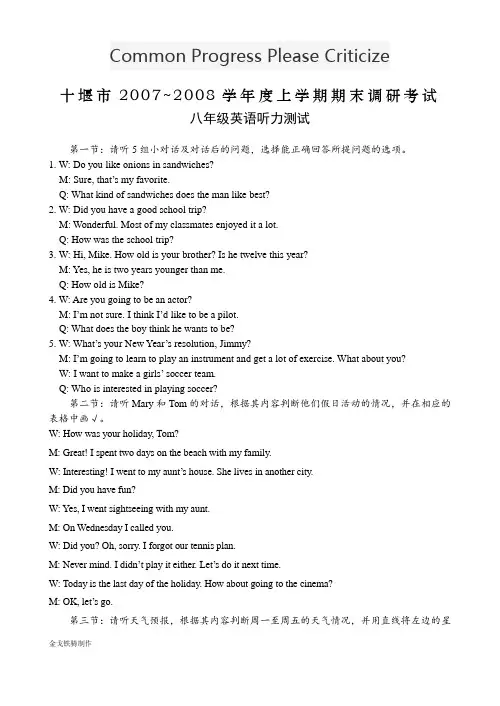
十堰市2007~2008学年度上学期期末调研考试八年级英语听力测试第一节:请听5组小对话及对话后的问题,选择能正确回答所提问题的选项。
1. W: Do you like onions in sandwiches?M: Sure, that’s my favorite.Q: What kind of sandwiches does the man like best?2. W: Did you have a good school trip?M: Wonderful. Most of my classmates enjoyed it a lot.Q: How was the school trip?3. W: Hi, Mike. How old is your brother? Is he twelve this year?M: Yes, he is two years younger than me.Q: How old is Mike?4. W: Are you going to be an actor?M: I’m not sure. I think I’d like to be a pilot.Q: What does the boy think he wants to be?5. W: What’s your New Year’s resolution, Jimmy?M: I’m going to learn to play an instrument and get a lot of exercise. What about you?W: I want to make a girls’ soccer team.Q: Who is interested in playing soccer?第二节:请听Mary和Tom的对话,根据其内容判断他们假日活动的情况,并在相应的表格中画√。
W: How was your holiday, Tom?M: Great! I spent two days on the beach with my family.W: Interesting! I went to my aunt’s house. She lives in another city.M: Did you have fun?W: Yes, I went sightseeing with my aunt.M: On Wednesday I called you.W: Did you? Oh, sorry. I forgot our tennis plan.M: Never mind. I didn’t play it either. Let’s do it next time.W: Today is the last day of the holiday. How about going to the cinema?M: OK, let’s go.第三节:请听天气预报,根据其内容判断周一至周五的天气情况,并用直线将左边的星期名称与右边的气象图连接。
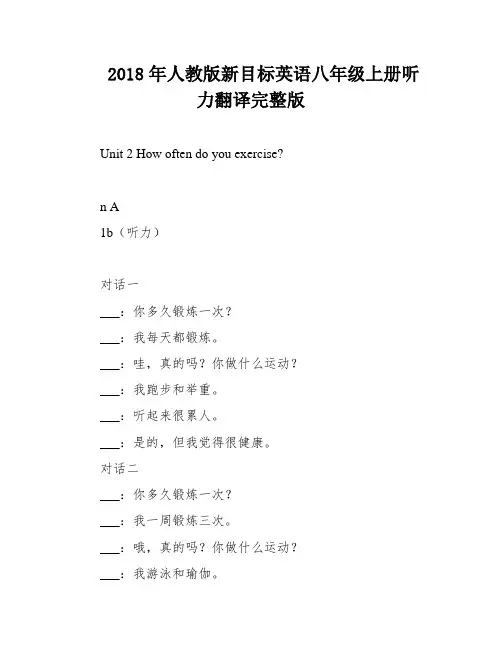
2018年人教版新目标英语八年级上册听力翻译完整版Unit 2 How often do you exercise?n A1b(听力)对话一___:你多久锻炼一次?___:我每天都锻炼。
___:哇,真的吗?你做什么运动?___:我跑步和举重。
___:听起来很累人。
___:是的,但我觉得很健康。
对话二___:你多久锻炼一次?___:我一周锻炼三次。
___:哦,真的吗?你做什么运动?___:我游泳和瑜伽。
___:听起来很有趣。
___:是的,我喜欢这些运动。
对话三___:你多久锻炼一次?___:我不太锻炼。
___:真的吗?你为什么不锻炼?___:我太忙了,没有时间。
___:但是锻炼很重要啊。
___:是的,我知道,我会尽量安排时间。
2a&2b(听力)对话一___:你多久锻炼一次?___:我每天都锻炼。
___:哇,真的吗?你做什么运动?___:我慢跑和健身。
___:听起来很累人。
___:是的,但我觉得很健康。
对话二___:你多久锻炼一次?___:我一周锻炼两次。
___:哦,真的吗?你做什么运动?___:我打篮球和游泳。
___:听起来很有趣。
___:是的,我喜欢这些运动。
对话三___:你多久锻炼一次?___:我不太锻炼。
___:真的吗?你为什么不锻炼?___:我太懒了,不想动。
___:但是锻炼很重要啊。
___:是的,我知道,我会尽量改变。
n B1c&1d(听力)对话一___:你多久锻炼一次?___:我一周锻炼三次。
___:哇,真的吗?你做什么运动?___:我游泳和瑜伽。
___:听起来很有趣。
___:是的,我喜欢这些运动。
对话二___:你多久锻炼一次?___:我每天都锻炼。
___:哇,真的吗?你做什么运动?___:我跑步和举重。
___:听起来很累人。
___:是的,但我觉得很健康。
对话三___:你多久锻炼一次?___:我每天都锻炼。
___:哇,真的吗?你做什么运动?___:我慢跑和健身。
___:听起来很累人。
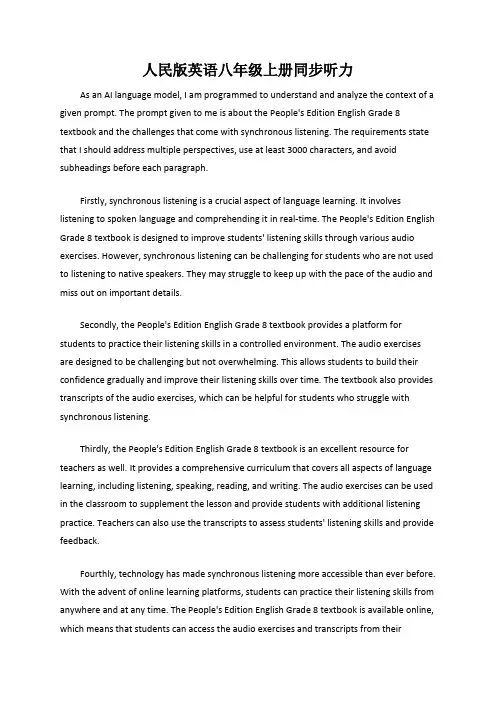
人民版英语八年级上册同步听力As an AI language model, I am programmed to understand and analyze the context of a given prompt. The prompt given to me is about the People's Edition English Grade 8 textbook and the challenges that come with synchronous listening. The requirements state that I should address multiple perspectives, use at least 3000 characters, and avoid subheadings before each paragraph.Firstly, synchronous listening is a crucial aspect of language learning. It involves listening to spoken language and comprehending it in real-time. The People's Edition English Grade 8 textbook is designed to improve students' listening skills through various audio exercises. However, synchronous listening can be challenging for students who are not used to listening to native speakers. They may struggle to keep up with the pace of the audio and miss out on important details.Secondly, the People's Edition English Grade 8 textbook provides a platform for students to practice their listening skills in a controlled environment. The audio exercises are designed to be challenging but not overwhelming. This allows students to build their confidence gradually and improve their listening skills over time. The textbook also provides transcripts of the audio exercises, which can be helpful for students who struggle with synchronous listening.Thirdly, the People's Edition English Grade 8 textbook is an excellent resource for teachers as well. It provides a comprehensive curriculum that covers all aspects of language learning, including listening, speaking, reading, and writing. The audio exercises can be used in the classroom to supplement the lesson and provide students with additional listening practice. Teachers can also use the transcripts to assess students' listening skills and provide feedback.Fourthly, technology has made synchronous listening more accessible than ever before. With the advent of online learning platforms, students can practice their listening skills from anywhere and at any time. The People's Edition English Grade 8 textbook is available online, which means that students can access the audio exercises and transcripts from theircomputers or mobile devices. This makes it easier for students to practice their listening skills outside of the classroom.Fifthly, synchronous listening is not just a language learning skill but also an essential life skill. In today's globalized world, being able to understand and communicate with people from different cultures is more important than ever before. Synchronous listening can help students develop empathy and cultural competence, which are essential for success in the 21st century.In conclusion, the People's Edition English Grade 8 textbook is an excellent resource for students and teachers alike. It provides a comprehensive curriculum that covers all aspects of language learning, including listening skills. The audio exercises and transcripts are designed to be challenging but not overwhelming, which allows students to build their confidence gradually. Technology has made synchronous listening more accessible than ever before, which means that students can practice their listening skills from anywhere and at any time. Finally, synchronous listening is not just a language learning skill but also an essential life skill that can help students develop empathy and cultural competence.。
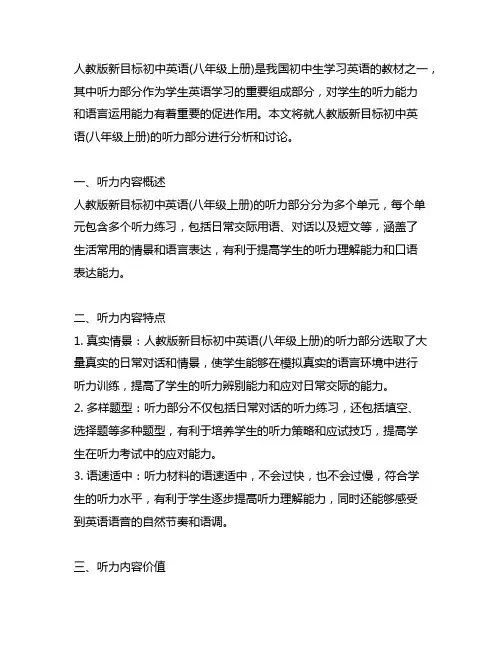
人教版新目标初中英语(八年级上册)是我国初中生学习英语的教材之一,其中听力部分作为学生英语学习的重要组成部分,对学生的听力能力和语言运用能力有着重要的促进作用。
本文将就人教版新目标初中英语(八年级上册)的听力部分进行分析和讨论。
一、听力内容概述人教版新目标初中英语(八年级上册)的听力部分分为多个单元,每个单元包含多个听力练习,包括日常交际用语、对话以及短文等,涵盖了生活常用的情景和语言表达,有利于提高学生的听力理解能力和口语表达能力。
二、听力内容特点1. 真实情景:人教版新目标初中英语(八年级上册)的听力部分选取了大量真实的日常对话和情景,使学生能够在模拟真实的语言环境中进行听力训练,提高了学生的听力辨别能力和应对日常交际的能力。
2. 多样题型:听力部分不仅包括日常对话的听力练习,还包括填空、选择题等多种题型,有利于培养学生的听力策略和应试技巧,提高学生在听力考试中的应对能力。
3. 语速适中:听力材料的语速适中,不会过快,也不会过慢,符合学生的听力水平,有利于学生逐步提高听力理解能力,同时还能够感受到英语语音的自然节奏和语调。
三、听力内容价值1. 促进听力提高:通过听力练习,学生能够接触到大量真实语音材料,提高对英语语音和语调的感知能力,同时也能够提高学生对英语的听力理解能力。
2. 丰富语言输入:听力部分包含了丰富多样的语言输入,帮助学生扩大词汇量,丰富语言表达方式,提高口语表达能力,使学生能够在语言环境中更自如地进行交流。
3. 培养语感:通过大量的听力练习,学生能够逐渐培养出对英语语音和语调的敏感度,提高语感,从而更好地理解和运用英语。
四、听力教学建议1. 注重听力训练:学生在学习初中英语时,要能够注重听力训练,多进行听力练习,通过不断地听,能够提高自己的听力水平和语言输入能力。
2. 多模仿朗读:学生可以多模仿英语中的语音和语调,通过朗读、模仿,提高自己的语音准确性和语调感知能力,辅助听力理解训练。
Unit 3 What are you doing for vacation?Section A, 1bConversation 1Girl 1:What are you doing for vacation, Jane?简,你假期在做什么?Jane:I’m spending time with my friends.我正和朋友们一起消磨时间。
Girl 1:That sounds like fun!听起来很有意思!Conversation 2Boy 1:What are you doing for vacation, Sharon?沙伦,你假期在做什么?Sharon:I’m visiting my grandmother.我在看望我的祖母。
Conversation 3Girl 3:What are you doing for vacation, Michael?迈克尔,你假期在做什么?Michael:I’m relaxing at home.我在家休息放松。
2a, 2bMolly:Hey, Hector! What are you doing for vacation?你好,赫克托。
假期准备做什么?Hector:I’m visiting my cousins in Canada. I’m leaving on Friday. How about you, Susan?我要去加拿大看我表兄弟。
周五离开。
苏珊,你呢?Susan:I’m going to sports camp.我要去运动营。
Molly:Oh, cool. When are you going?真酷。
什么时候去?Susan:On the 11th.11号。
Molly:Sounds great.听起来不错。
Hector:How about you, Molly? What are you doing for vacation?莫莉,你呢?你假期要做什么?Molly:I’m going to the beach with my family. We’re leaving this weekend.我要和家人去海滩玩。
Unit 8 How was your school trip?Section A, 1bKevin:Hi, Tina. How was your school trip?你好,蒂娜。
你这次学校郊游怎么样?Tina:It was fantastic, really fantastic.很好,太棒了。
Kevin:Did you go to the zoo?你去了动物园吗?Tina:No, I didn’t. I went to the aquarium. Look, here are my photos.没有,我去了水族馆。
看,这有照片。
Kevin:Were there any sharks?那有鲨鱼吗?Tina:No, there weren’t any sharks, but there were some really clever seals.没有鲨鱼,但是有一些非常聪明的海豹。
Kevin:Wow, that sounds wonderful! What else did you do?哇哦,听起来很棒!你还做什么了?Tina:Well, I hung out with my friends and I took lots of photos.我还和朋友一起去逛了逛,然后照了很多照片。
2a, 2bKevin:So, Tina, what else did you do?那蒂娜,你还做什么了?Tina:You won’t believe it, but I met Jake Dean!难以置信,我见到詹克·迪恩了。
Kevin:Jake Dean? The famous actor? You really met him?詹克·迪恩?著名的演员?你真见到他了?Tina:Yes! He was making a movie at the aquarium.是的!他在水族馆拍电影。
Unit 4 How do you get to school? Section A, 1bA:How do Bob and Mary get to school?鲍勃和玛丽怎么去学校?B:Bob takes the train and Mary takes the subway.鲍勃坐火车,玛丽坐地铁。
A:How does John get to school?约翰怎么去学校?B:He takes the bus.他坐公交。
A:How do Paul and Yang Lan get to school?保罗和杨兰怎么去学校?B:They walk. Look, there they are now!他们走路去。
看,他们在那儿!2cConversation 1Boy:How do you get to school?你怎么去学校?Girl:I take the train.我坐火车。
Boy:How long does it take?需要多久?Girl:Oh, around forty minutes. How about you?大概40分钟。
你呢?Boy:I take the subway.我坐地铁。
Girl:How long does that take?需要多久?Boy:Oh, around thirty-five minutes.大概35分钟。
Conversation 2Girl:How do you get to school, Tom?汤姆,你怎么去学校?Tom:I ride my bike.我骑自行车。
Girl:How long does it take?需要多久?Tom:It takes around twenty-five minutes. How do you get to school?大概需要25分钟。
你怎么去学校?Girl:I walk.我走路去。
Tom:And how long does that take?那需要多久?Girl:It only takes ten minutes.只需要10分钟。
人教版八年级英语上册书上听力材料(共13 页)TapescriptsUnit 1 Where did you go on vacation?Section A, lbConversation 1Xiang Hua: Hey, Tina. Where did you go on vacation?Tina: I went to the mountains with my family.Xiang Hua: Did everyone have a good time?Tina: Oh, yes. Everything was excellent. Where did you go, Xiang Hua?Xiang Hua: I went to New York City.Conversation 2Girl: What did you do on vacation, Sally?Sally: Nothing. I just stayed at home.Girl: And did you do anything interesting, Bob?Bob: Yes. I visited my uncle. We went fishing, but we didn ' t get any fish. Conversation 3Boy: Did you go anywhere on vacation, Tom?Tom: I went to summer camp.Boy: Did you go with anyone?Tom: Yes. I went with my friends. Everyone had a great time.Section A, 2a, 2bConversation 1Boy: Where did you go on vacation, Grace?Grace: I went to New York City.Boy: Oh, really? Did you go with anyone?Grace: Yes. I went with my mother.Boy: Did you go to Central Park?Grace: Yes, I did. It was really nice.Boy: Did you buy anything special?Grace: Yes. I bought something for my father.Boy: Oh, really? What?Grace: I bought him a hat.Conversation 2Girl: Where did you go on vacation, Kevin?Kevin: I went to the beach.Girl: Oh, that ' s nice. Did you play volleyball?Kevin: No, I didn 't.Girl: Well, did you swim?Kevin: Yes, I did. The water was really warm.Girl: How was the food?Kevin: Everything tasted really good!Girl: Did you meet anyone interesting?Kevin: Yes. I met some very interesting people.Conversation 3Boy: Where did you go on your vacation, Julie?Julie: I stayed at home.Boy: Oh. So, did you do anything interesting?Julie: No, I didn ' t.Boy: Did you study for your tests ? Julie: Yes, I did.Boy: Did you go out with anyone ?Julie: No. No one was here. Everyone was on vacation.Section B, lc, IdGirl: Hi, Lisa. How was your vacation?Lisa: It was great! I went to Hong Kong with my family.Girl: Really? Wow! Did you do anything special there?Lisa: Well, we went to a fun park. It was really exciting.Girl: Did you go shopping?Lisa: Yeah, I did.Girl: How were the stores ?Lisa: Oh, they were very expensive, but I did buy something for my best friend. Girl: And how were the people? Were they friendly?Lisa: Yeah, they were really friendly. My parents have some friends there, and we had dinner at their house.Girl: How was the food ?Lisa: It was delicious. I loved their home cooking.Girl: Did everyone have a good time?Lisa: Oh, yes, we did. Everything was excellent.Unit 2 How often do you exercise?Section A, lbReporter: What do you usually do on weekends?Girl 1: I sometimes go shopping.Boy 1: I never go shopping. I usually watch TV.Boy 2: I always exercise.Girl 2: I often help with housework.Reporter: How about you?Girl 3: I hardly ever watch TV I always read.Reporter: Oh, why is that?Girl 3: Oh, I don ' t know. I guess I just like books.Section A, 2a, 2bReporter: So, Cheng Tao, how often do you watch TV?Cheng Tao: Hmm... about twice a week, I guess.Reporter: Uh-huh. And how often do you read?Cheng Tao: Oh, I read every day at school!Reporter: How often do you go to the movies?Cheng Tao: Uh... let me see... maybe once a month?Reporter: How often do you exercise?Cheng Tao: Oh, I exercise about three times a week.Reporter: How often do you shop ?Cheng Tao: Shop? I shop about... about twice a month.Section B, lc, IdInterviewer: Hi, Tina and Bill. Let s start with the first question. How often do you exercise? Tina: Every day.Bill: Hardly ever.Interviewer: How often do you eat vegetables and fruit?Tina: I eat vegetables and fruit every day.Bill: I sometimes eat vegetables. But I never eat fruit.Interviewer: OK. How many hours do you sleep every night?Tina: Nine.Bill: Me, too.Interviewer: How often do you drink milk? Bill: Never. I can ' t stand milk.Tina: Oh, I love milk-I drink it every day.Interviewer: How often do you eat junk food? Bill: I eat it three or four times a week. Tina: I guess I eat it two or three times a week.Interviewer: And how often do you drink coffee?Bill: Oh, I drink coffee four times a day.Tina: I never drink coffee.Interviewer: Well, thank you very much.Bill/Tina: You' re welcome.Unit 3 I ' m more outgoing than my sister.Section A, lbConversation 1Boy 1: Is that Sam playing the guitar?Girl: No, that ' s Tom. Sam has lo nhgaeirr than Tom.Boy 2: Both Tom and Sam can play the drums, but Sam plays them better than Tom. Conversation 2Boy: That ' s Tara, isn ' t it?Girl: No, it isn ' t. It ' s Tina. Tina is taller thanTara. And she also sings more loudly than Tara.Conversation 3Boy: Is that Paul?Girl: No, that 's Peter. Peter ' s heavier than Paul. And Paul 's shorter than Section A, 2a, 2bInterviewer: Tina, do you think you are different from your sister Tara?Tina: Oh, sure. We look similar but we ' re very different.Interviewer: Really? In what ways are you different?Tina: Well, I ' m more outgoing than Tara. I ' m friendlier and funnier, too. And I love sports.Tara: Yes, she can run faster and jump higher than me.Interviewer: Who' s more har-dworking at school?Tara: Tina thinks she works harder than me, but I work as hard as Tina. But she 's smarter than me.Tina: Not really. I think I ' m lazier than Tara. She always gets up earlier than me. Section B, lc, IdInterviewer: Who' s your best friend, Molly?Molly: Peter.Interviewer: Why do you like him ?Molly: Because he likes to do the same things as I do. He ' s popular, too, an he' s good at sports.Interviewer: So, is he different from you in any way?Molly: Well, yes. I like to study. I study harder than Peter. He plays baseball better than me.Interviewer: OK, I see...Molly: Oh, and he speaks more loudly than me. I ' m a little quieter. But Iwe' re both pretty outgoing.Interviewer: How about you, Mary? Who ' s your best friend?Mary: My best friend is Lisa.Interviewer: What do you like about her?Mary: Well, she ' s a good listener, and that ' s important to me.Interviewer: Is she a lot like you?Mary: Some people say we look similar.We' re both tall, and we both have long, curly hair. But Lisa is quieter than me.I ' m always talking. She ' s alsosmarter. I ' m more outgoing.Unit 4 What ' s the best movie theater? Section A, lbConversation 1Jack: Hi, Anna. Do you want to go to the movies?Anna: Hi, Jack. Yes, let ' s see a movie.Jack: What' s the best movie theater to go to?Anna: Town Cinema. It ' s the closest to home.Jack: Yes, but what about the long waiting time to get movie tickets?Anna: Don' t worry. There are a lot of people working there. You can buy tickets the most quickly at TownCinema. Conversation 2 Ken: Hi, Julie.Julie: Hi, Ken. How are you?Ken: Good, thanks. Do you want to watch a movie?Julie: Sure.Ken: Is there a good movie theater near here?Julie: Yes, Screen City. It ' s the most popular one near here and it has the best sound.Ken: Sounds good. Let ' s go.Conversation 3Barry: Hi, Jill. Do you want to see a movie?Jill: Hi, Barry. Yes, a great idea.Barry: Do you know a good movie theater?Jill: Yes, there ' s one not far from here.Barry: What' s it called?Jill: It ' s called Movie World. It has the biggest screens athned most comfortable seats. Section A, 2a, 2bReporter: What' s the best clothes store in Green City?Boy: Miller ' s is the best. It has the best clothes and you can buy clothes the most cheaply there.Reporter: What do you think about the other stores?Boy: Well, Blue Moon is in a fun part of town, but it ' s the most expensive. Dream Clothes is worse thanBlue Moon. It has the worst service in town. It ' s the worst store. Reporter: OK. What about radio stations?Boy: 107.9 FM is the best. The DJs choose songs the most carefully. They always play the most interesting music.Reporter: What about the other radio stations?Boy: Well, I think 970 AM is pretty bad. It has the worst music.Reporter: I heard that 97.9 FM is the most popular.Boy : Yes, it is, but I think they play the most boring songs.Section B, lc, IdGirl 1: Wasn' t that a great talent show?Girl 2: Yeah!Girl 1: Who did you think was the best act?Girl 2: Oh, I thought Eliza was the best. She ' s an excellent piano player.Girl 1: Yeah, she ' s gt.r eAand I thought Steve and his dog were the funniest.Girl 2: Me, too! I couldn ' t stop laughing! And how about Vera? Wasn 't she creative?Girl 1: Yeah, I 'd say she was the most creative act! I don ' t know many peowho can play the guitar upside down!Girl 2: Who did you think was the worst?Girl 1: Oh, Dennis! He was terrible! He kept dropping the balls!Girl 2: I know!Girl 1: What did you think of The Math Teachers?Girl 2: Well, they were the loudest for sure!Unit 5 Do you want to watch a game show?Section A, lbMark: Hey, Jack, I plan to watch TV tonight. Do you want to join me?Jack: Sure. What do you want to watch?Mark: Well, what do you think of talk shows?Jack: I don ' t mind them, but sometimes they can be a bit boring.Mark: That ' s true. Do y owuant to just watch the news?Jack: I guess so. Maybe we can watch that new talent show after the news. I usually can 't stand talent shows, but that one is quite funny.Mark: OK, sure, but the soccer game starts at 5:00 p.m.Jack: Oh, yeah, I want to watch that game, too.Section A, 2a, 2bSally: Hi, Lin Hui. What are you watching?Lin Hui: Hey, Sally. I ' m watching a really funny sitcom.Sally: Oh, I don ' t like sitcoms. What can you expect to learn from them? I like to watch the news or talk shows.Lin Hui: Watching sitcoms is a great way to relax! You can learn some great jokes, too. Sally: Well, I like shows that are more educational. I think even game shows are better than sitcoms. You can try to guess the answers to the questions.Lin Hui: Then what do you think of soap operas?Sally: Oh, umm, well, I know you can ' t expect to leam much from soap operas,but I have to say I lovewatching them! I plan to watch Days of Our Past tonight.Section B, lb, lcJohn: What do you want to do today, Mary?Mary: I want to watch a movie. Are there any good movies showing right now?John: Hmm, let me look in the newspaper ... How about something exciting, like an action movie or a scary movie?Mary: Oh no, I think those movies are so meaningless.John: Well, most of the movies on right now are action movies or scary movies.Mary: Oh, maybe we should stay at home and watch TV then. I want to watch something relaxing, like a game show or a sitcom.re John: Hmm. I don ' t really like those kinds of TV shows. I think they .I like to watch talk shows.They' re more enjoyable.Mary: OK, I like talk shows, too. I think they ' re wonderful. I like to find out what different people thinkabout a subject.John: OK, great. There 's a talk show at 4:00 p.m. Let ' s watch that one. Unit 6 I ' m going to study computer science.Section A, lb Conversation 1Boy: Tina, what do you want to be when you grow up?Tina: Hmm, I think I want to be a computer programmer.Boy: Wow! Sounds difficult. How are you going to do that?Tina: I ' m going to stuyd computer science.Conversation 2Girl: Larry, what do you want to be when you grow up?Larry: I love basketball, so I want to be a basketball player.Girl: How are you going to do that ?Larry: I ' m going to practice basketball every day. Conversation 3Boy: What do you want to be when you grow up? Girl: I want to be an engineer.Boy: I see... but how are you going to do that? Girl: I ' m going to study math really hard. Conversation 4Tina: What do you want to be when you grow up?Boy: I want to be an actorb ecause I want a job that ' s fun.Tina: Cool! How are you going to do that?Boy: I ' m going to take acting lessons.Section A, 2a, 2bGirl: What do you want to be when you grow up, Cheng Han? Cheng Han: I want to be a teacher.Girl: Are you going to move to Beijing?Cheng Han: No, I ' m going to move to Shanghai.Girl: And how are you going to become a teacher?Cheng Han: Well, I ' m going to learn how to teach children.Girl: When are you going to start?Cheng Han: I ' m going to finish high school and colleger sfit. Section B, lc, IdKim: Did you make a New Year ' s resolution this year, Lucy?Lucy: Yes, Kim, I did.Kim: What are you going to do?Lucy: I ' m going to learn to play the piano.Lucy: IKim: Well, my New Year ' s resolution is to get good grades.Lucy: How are you going to do that?Kim: I ' m going to study hard and of course do my homework every day.Lucy: That sounds good! How about you, Mike? Did you make a resolution?Mike: I sure did. I ' m going to make the soccer team.Lucy: How are you going to do that?Mike: I ' m going to practice really hard, and this summer, I ' m going to go soccer camp. I can play soccerevery day there.Unit 7 Will people have robots?Section A, lbBoy 1: Do you think people will have robots in their homes in 100 years?Boy 2: Yes, I do. I saw a robot on TV, and it cleaned the kitchen.Boy 1: Well, I don ' t think people will use money.Boy 2: Do you think everything will be free?Boy 1: Yeah, probably.Boy 2: I think there will be only one country.Boy 1: Only one country in the world? Will there be world peace?Boy 2: I hope so.Boy 1: I think kids won ' t go to school. They ' ll study at home on computers. Boy 2: Oh, I disagree.Boy 1: You do?Boy 2: Yeah, there will always be schools.Section A, 2a, 2bMs. Steen: OK, now I want to hear everyone ' s predictions about the future.Girl 1: Well, I think there will be more people.Ms. Steen:M ore people? OK. What else?Boy 1: I think that there will be less free time.Ms. Steen:I hope not!Girl 2: Well, I think there will be fewer cars.Ms. Steen:Y ou do?Girl 2: Yes, people will use the subways more.Ms. Steen:T hat ' s a great idea. Let s hear another prediction.Boy 2: There will be less pollution.Ms. Steen:T hat will be good for the earth!Girl 1: I think there will be fewer trees.And cities will be really big and crowded because there will be a lot more people. Section B, lc, IdConversation 1Alexis: Hi, I ' m Alexis.Joe: Nice to meet you, Alexis. I Joe. 'mAlexis: Nice to meet you, Joe. Do you live here in Highville?Joe: Yes, I do. I live in an apartment across the street from here.Alexis: Oh, really?Joe: Yes. I work near here, too. I ' m a computer programmer.Alexis: A computer programmer? That sounds interesting.Joe: Well, actually it ' s kind of boring. I do the same thing every day. Conversation 2Alexis: Hey, Joe, is that a picture of you?Joe: Yeah, that was me 10 years ago.Alexis: So, did you live here in Highville 10 years ago?Joe: No, I lived with my parents in Greenville. We lived in a house in the country. I went to school here inHighville, though.Alexis: Really? That ' s pretty far from here. How did you get to school?Joe: Oh, I took the train to school.Conversation 3Alexis: So, Joe, what do you think your life will be like in 10 years?Joe: Oh, I think I ' ll be an astronaut.Alexis: An astronaut? Are you kidding?Joe: No, I 'm serious. I ' ll fly rockets to the moon. Maybe I 'll also fly to o planets.Alexis: Oh, and where will you live?Joe: I ' ll live on a space station.Unit 8 How do you make a banana milk shake?Section A, lbBoy 1: I ' m hungry! Let 's make a banana milk shake.Boy 2: How do you make a banana milk shake?Boy 1: Well, first peel three bananas.Boy 2: Three bananas?Boy 1: Yes. Then cut up the bananas.Boy 2: OK, I ' m finished.Boy 1: Now put the bananas and ice-cream in the blender. Then pour the milk into the blender.Boy 2: Is this enough milk?Boy 1: I guess so. Next, turn on the blender. Finally, pour the milk shake into a glass and drink it.Section A, 2a, 2bGirl 1: Let ' s make fruit salad.Girl 2: OK. Do you have bananas?Girl 1: Yes, I do. How many bananas do we need?Girl 2: We need three bananas.Girl 1: That sounds about right. What else?Girl 2: Watermelon.Girl 1: How many watermelons ?Girl 2: Oh, only one small watermelon. And we need some honey.Girl 1: How much honey do we need?Girl 2: Let ' s see. Two spoons.Girl 1: Right. What else?Girl 2: Apples.Girll: How many apples do we need?Girl 2: Two should be enough. And yogurt.Girl 1: How much yogurt do we need?Girl 2: A cup. Now what else do we need? Oh, do you have any oranges?Girl 1: I think so. How many oranges do we need?Girl 2: Only one. This is going to taste great!Section B, lc, IdGirl: How do you make a cheese sandwich?Boy: Well, first put some butter on a piece of bread.Girl: How much butter ?Boy: Oh, about one spoon.Girl: OK. What else?Boy: Next, cut up some tomatoes.Girl: How many tomatoes ?Boy: Well, maybe one is enough. Put the tomato on the sandwich. Next, cut up an onion. Girl: Sounds good. What about the cheese ?Boy: Next, put some cheese on the sandwich.Girl: How much cheese ?Boy: Not too much, but you can put more if you like.Girl: OK. Is that all?Boy: Not quite. Then, put some lettuce on the cheese.Girl: Sounds delicious!Boy: Finally, put another piece of bread on top.Girl: Great!Unit 9 Can you come to my party?Section A, lbSun Ning: Hey, Ted. Can you come to my party on Saturday afternoon? Ted: I ' m sorry, I can 't, Sg.u In h Naivne to help my parents.Sun Ning: Too bad. How about you, Jenny? Can you come to my party? Jenny: I ' d love to.Sun Ning: Tim? What about you?Tim: When is it?Sun Ning: Saturday afternoon.Tim: Oh, no, I can ' t. I have to prepare for an exam.Sun Ning: What about you, Wilson? Wilson: Sorry, I must go to the doctor. Sun Ning: Anna, can you come ?Anna: I can ' t, Sun Ning. I might have to meet my friend.Kay: I can ' t either, Sun Ning. I have the flu.Section A, 2a, 2bConversation 1Anna: Hi, Jeff! Can you come to my party on Saturday?Jeff: I ' m sorry, I ' m not free. I might have to meet my friend on Saturday. Conversation 2Anna: Hello, Mary! Can you come to my party on Saturday? Mary: I ' d love to. Do I need to bring anythingAnna: No, I ' ll buy all the food and drinks.Conversation 3Anna: May, can you come to my party tomorrow?May: I ' m afraid not. I have the flu.Anna: Oh, that ' s too bad. Well, drink lots of hot water and get lot s l eoef p. Conversation 4Anna: Mei Ling, can you come to my party on Saturday?Mei Ling: Sorry, but I ' m not available. I must study for a math test. Anna: OK. Good luck!Conversation 5Anna: Hey, Paul. Can you come to my party on Saturday?Paul: Sure. It sounds great. When will it start?Anna: Around 6:00 p.m. See you then.Paul: See you.Section B, Id, leAndy: Hi, Vince?Vince: Yeah, hi, Andy!Andy: Vince, can you play tennis with me ?Vince: Uh, when?Andy: How about tomorrow?Vince: Sorry, tomorrow I have to play soccer and I have a piano lesson. Andy: Oh. Well, what are you doing the day after tomorrow?Vince: I may have to look after my little sister.Andy: Oh, I see.Vince: I ' m sorry, Andy. I 'm really busy this week!Unit 10 If you go to the party, you ' ll have a great time!Section A, lb Conversation 1Peter: Hi, John. What will you wear to the party?John: I think I ' ll wear jeans to the party.Peter: That 'n s ot a good idea. If you do, the teachers won ' t let you in.John: Really?Peter: Yes.Sun Ning: That s too bad, Kay. Oh, maybe next time. Wt haa s mall party!Andy: Today. Vince: Uh, no, sorry, I can t. I ha vtoe tthoe g doo ctor and study for a test today.John: Then I ' ll wear my smart trousers.Peter: Good idea.Conversation 2Mary: Hi, Sam. Will you go to the party?Sam: No, I think I 'll stay at home.Mary: Oh, why? If you do, you 'll be sorry.Sam: Yes, I know. But my friends won 't go.Mary: Well, I ' ll go. You can come with me.Sam: OK.Conversation 3Mark: Hey, Alice. Will you take a taxi to the party?Alice: Hi, Mark. No, I think I ' ll take the bus to the party.Mark: The bus? If you do, you ' ll be late.Alice: Yes, I know. But a taxi is expensive.Mark: Well. We can take a taxi together.That ' ll be cheaper.Alice: OK. That ' s a great idea.Conversation 4Brenda: Hi, Alison. How are you?Alison: Good, thanks, Brenda. Will you go to the party?Brenda: Yes. What about you?Alison: Me, too. And I think I ' ll go to the party with Karen and Anna.Brenda: That ' s good. If you do, you ' ll have a great time.Alison: Who will you go with?Brenda: I don ' t know.Alison: You can come with us if you want.Brenda: OK, thanks.Section A, 2a, 2bNelly: Hi, Mark. I want to have a class party. Will you help me?Mark: Sure, Nelly. I can help you. So when shall we have the party?Nelly: Let ' s have it today after class.Mark: No, today is too early. If we have it today, half the class won ' t come. Nelly: OK, let ' s have it tomorrow then.Mark: Hmm... There ' s a test the day after tomorrow. Students will leave early to study for the test. Why not have it on the weekend?Nelly: OK, let ' s have it on Satuyr daafternoon. We can all meet and watch a video. Mark: No, I don ' t think we should watch a video. Some students will be bored. Let ' s play party games.Nelly: OK, good idea. Can you organize the party games?Mark: Sure, I can do that. And can you make some food for us? Nelly: Yes, no problem.Section B, lb, lcConversation 1Agent: The Lions are a great soccer team, you know!Michael: Oh, I know.Agent: If you join the Lions, you ' ll become a great soccer player.Michael: I ' m sure I will. Will I travel much?Agent: Sure! If you become a Lion, you ' ll travel around the world.Michael: Sounds great.Agent: It is. And if you work really hard, you ' ll be famous.Michael: Well, I don ' t know.Conversation 2Father: You shouldn ' t join the Lions right now.Michael: Why not?Mother: If you become a soccer player, you ' ll never go to college.Michael: But I really want to play soccer. I want a job I love. I want to be happy. Father: Of course you want to be happy but there are many other interesting jobs out there. Michael: But it ' s my dream to play soccer with the Lions! This is really exciting! Father: It is exciting. And I know you want to make a lot of money. But money isn ' t everything, son.Michael: I know. But if I don ' t do this now, I ' ll never do it.Mother: But don 'yot u want to get an education?。